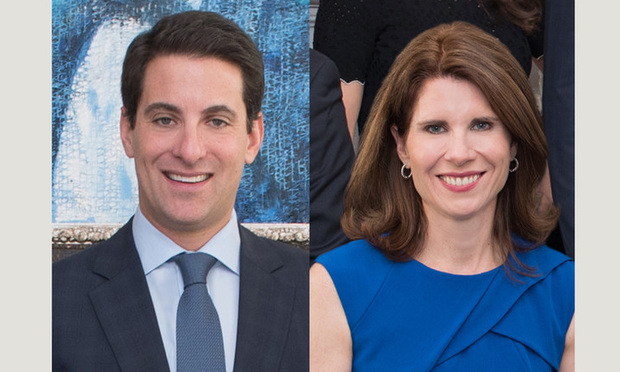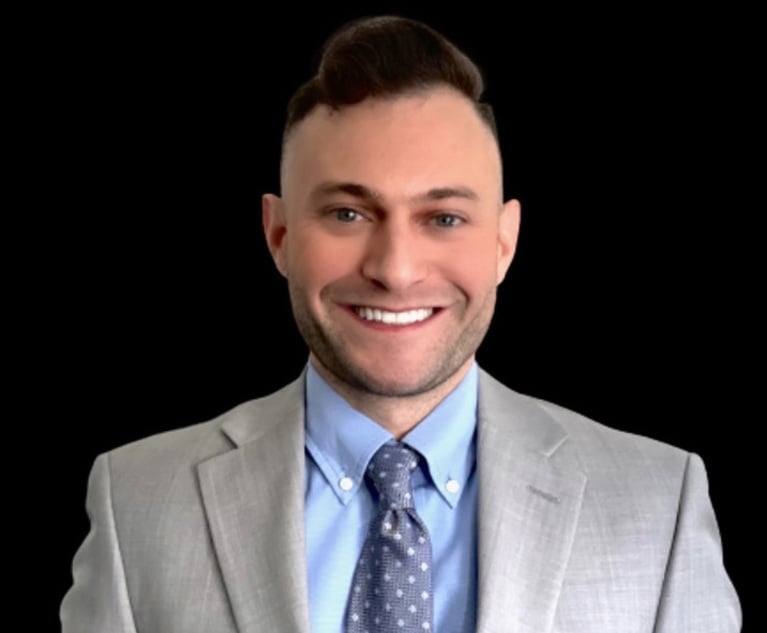How Wilkinson Walsh + Eskovitz Partners Shredded Witnesses in a $600M Save for Bayer
If cross-examination is an art form, then Wilkinson Walsh + Eskovitz name partners Alexandra Walsh and Sean Eskovitz are masters, leading a trial team defending Bayer AG against a $600 million class action over its One A Day multivitamin.
February 26, 2019 at 12:17 PM
12 minute read
The original version of this story was published on Litigation Daily
If cross-examination is an art form, then Wilkinson Walsh + Eskovitz name partners Alexandra Walsh and Sean Eskovitz
 Sean Eskovitz, left, and Alexandra Walsh, right, of Wilkinson Walsh + Eskovitz.
Sean Eskovitz, left, and Alexandra Walsh, right, of Wilkinson Walsh + Eskovitz.If cross-examination is an art form, then Wilkinson Walsh + Eskovitz name partners Alexandra Walsh and Sean Eskovitz are masters.
The duo led a trial team defending Bayer AG, which faced a $600 million certified consumer class action over its One A Day multivitamin. The plaintiffs alleged Bayer made false and misleading claims that One A Day supported heart health, immunity and physical energy.
How good were the cross-examinations? So good that that the WW+E team called no defense witnesses. They annihilated the case on crosses alone.
After a week-long trial, a federal jury in San Francisco on Feb. 22 took just an hour to find for the defense across the board.
It's a little like slowing down to look at a car crash, but through the magic of trial transcripts, let's see how they shredded two key witnesses.
First up is Eskovitz, who questioned plaintiffs' expert Dr. Edward Blonz.
On direct by plaintiffs lawyer Jeffrey Tillotson of Tillotson Law in Dallas (who did not respond to a request for comment), Blonz came across as articulate and clear. He testified that supplements like One A Day provide no benefit to average consumers. According to Blonz, almost everyone gets the nutrients they need from the food that they eat, unless they have some biochemical deficiency.
 Moreover, Blonz said there was no evidence that taking One A Day would enhance a person's immune system, give them more energy or prevent heart disease.
Moreover, Blonz said there was no evidence that taking One A Day would enhance a person's immune system, give them more energy or prevent heart disease.
Tillotson did try to head off a potential weak spot—that Blonz himself takes a multivitamin. But the doctor explained that he has epilepsy, and his medication affects how his body uses Vitamin D, requiring him to take a supplement.
Fair enough. But Eskovitz—showcasing meticulous preparation and a seemingly photographic memory—began by asking Blonz about his wife.
“And one of the things you do is you recommend that she take a daily multivitamin, right?”
“I have a multivitamin that I have for her to take, yes.”
Eskovitz keeps probing.
“And one of the reasons why you want her to take a multivitamin is to make sure she gets all of the vitamins and minerals that she needs. Right?”
“Some of them I'm more concerned about than others.”
And the clincher:
“And your wife doesn't have a biochemical deficiency in any vitamin or mineral, does she?”
“Not that I'm aware of.”
Eskovitz pivots to some of Blonz's past writing, including two books.
“Let's start with what you wrote in the 'Really Simple No-Nonsense Nutrition Guide'. … And let's look at the bottom of Page 81. I'm reading from your book: 'If, for any reason, you cannot or will not eat a healthy diet, consider taking a vitamin/mineral supplement. While it's always preferable to get these nutrients from food, this may not be possible. The bottom line: Better to get the nutrients from a supplement than not at all.'… And are you going to stand by that testimony here today?”
“Yes.”
Eskovitz turned to the poor diet of most Americans—80 percent of whom don't eat the recommended amount of vegetables and fruit.
“One A Day doesn't say: Take this multivitamin supplement instead of eating healthy. It doesn't say that anywhere on the package. Right?” Eskovitz said, eliciting an agreement.
He then pressed the doctor on the actual vitamins and minerals that One A Day contains—watch how he sets the trap.
“All of those vitamins and minerals are involved in heart health and immunity and physical energy, correct?”
“Correct.”
“… And when you're talking about the bodily processes, what you're talking about is chemical reactions inside the body that those vitamins and minerals play a role in within the body; correct?”
“Yes.”
“Chemical reactions relating to heart health; right?”
“Yes.”
“And immune health?”
“Yes.”
“And physical energy?”
“Correct.”
“And so in that sense you agree that the vitamins and minerals in One A Day help support heart health, immune health and physical energy; correct?”
“It depends on your definition of 'support.'”
“In the sense of playing a role in the chemical reactions in the body, you agree that the vitamins and minerals in One A Day help support heart health, immune health and physical energy; correct?”
“I would say with respect to the human body, those nutrients in the human body play a role in those functions.”
Well thank you very much.
Once Eskovitz got Blonz to practically side with Bayer, he attacked his credibility as an expert. First, he noted that Blonz had already been paid $50,000 by the plaintiffs, and that he'll earn even more for his trial prep and testimony—and that he makes most of his living as an expert witness.
“What percentage of your annual income comes from your work as an assistant clinical professor at UCSF?”
“Zero. I donate my time.”
“You don't receive any salary at all from the university?”
“No.”
“… And the last time you taught any kind of class, including as an extension instructor on dietary supplements, that was about ten years ago; right?”
“Yes.”
“Do you have an office at UC San Francisco?”
“No.”
“You've described your role as an assistant professor at UC San Francisco as really just a title; is that accurate?”
“Well, it's not a title. It basically is a—they don't give away titles.”
Eskovitz wasn't letting him get away with that.
“You testified a couple years ago in a case called Living Essentials,” he said. “Do you recognize that, the name of that case?”
“Yes.”
“I'm going to show you some testimony… Page 157, Lines 18 to 24 in the deposition in the Living Essentials case. You were asked the question: 'So this title, if you're not teaching, don't have an office, receive no salary, it's just a title, isn't it? Assistant clinical professor? It really—it doesn't really mean anything, does it?' ANSWER:' Just a title. It's a title.'”
Ouch.
Eskovitz brought up another case where Blonz was an expert. “And the judge in that case found that you had misstated the results of a study. Correct?”
“Yes.”
“And the judge, the federal judge in that case said that you had based your opinion on inaccurate and incomplete facts. Right?”
“Yes.”
The hits kept coming. “You've never offered the opinions that you're offering in this case in any kind of peer-reviewed scientific article, right?”
“No.”
“… In fact, you've never published any scientific peer-reviewed articles about vitamins or multivitamins; true?”
“True.”
So much for the plaintiffs expert.
It fell to Walsh to question the lead California plaintiff, Ilana Farar. On direct, Farar, a former real estate transactional lawyer who got her J.D. from USC, described herself as a busy stay-at-home mom. “I sort of joke that I'm a professional volunteer now. I think I've done every job at my kids' school,” she said.
Farar said she bought a bottle of One A Day at CVS because she ran out of her usual raw organic multivitamin.
But Farar's husband, Justin Farar, is a lawyer at Kaplan Fox, one of the firms that brought the case. On direct, Farar said that had no impact on her decision to get involved.
But Walsh on cross was skeptical.
“You've pointed out in all the years that you've taken multivitamins, you were always taking one that was raw and vegan and whole food-based; correct?”
“I tried to look for that language in the ones that I've purchased before; correct.”
“For some reason you were willing to buy One A Day even though it's not like that; right?”
“Yeah. True.”
While Eskovitz comes across as tough, Walsh at times took a softer approach, as this exchange shows.
Q.” So you think multivitamins can ensure that you get the nutrients that your body needs; correct?”
“Well, I don't believe that now.”
“So you didn't only take multivitamins on days when you had too many French fries though; right?”
“Well, I took them every day.”
“Exactly. Right. Even on the days when you're eating kale and spinach?”
“Yes. At the time I was, yes.”
“Eating kale and spinach?”
“Yeah, I mean, I love kale. I know I'm kind of weird, but I do.”
“With a lot of dressing it's pretty good.”
“Or sometimes in a smoothie.”
Nice, yes, but nice in a velvet-glove/iron-fist way.
“You know that the package says that it's not intended to prevent or treat or cure any disease; right?”
“Well, it doesn't say like a cold or something. But, yeah, a disease, like cancer or something.”
“Okay. Right. But just based on the words, it would not be reasonable for a person to think, after reading those words on the page, that you would never get sick if you took One A Day?”
“No. I thought it would boost my immunity, but not that it would be a never ever get sick-kind of thing.”
And with that Farar undermined allegations that she as a consumer was deceived by One A Day's health claims. (She also admitted she couldn't recall getting sick while taking the multivitamin.)
“You didn't say, 'Wow, I have had a bad experience with One A Day. I want to talk to a lawyer and see about maybe bringing a lawsuit'?”
“No, I didn't do that.”
“Okay. You heard about the lawsuit from your husband?”
“Yes.”
“Prior to hearing about the lawsuit from your husband, did you ever go back to the CVS and maybe—and, you know, try to get a refund for the One A Days since it wasn't working, according to you?”
“I didn't. I didn't hold CVS responsible for the product not doing what I thought it was going to do.”
“Okay. And you see on the box that there is a 1-800 number you can call. You can call Bayer if you want to hold Bayer accountable. You can call Bayer and tell them that you had an issue?”
“Oh, it says: 'Questions or comments please call.'”
“Did you call that number?”
“I did not.”
“Did you ask Bayer for a refund?”
“I did not. I'm asking today, but…”
“Right. But you didn't pick up the phone and say, Look, this isn't working for me. My nails are feeling weaker. May I please have a refund?”
“I did not.”
“Okay. Instead you joined the lawsuit?”
“Yes.”
“Okay. And your husband works at Kaplan Fox?”
“He works in the L.A. office, yes.”
” Okay. Now, the lawsuit, as you know, was filed by Kaplan Fox.”
Walsh wrapped it up with an admission from Farar that she thought One A Day does exactly what it's supposed to.
“If you are not getting the vitamins and minerals that you need from your diet, One A Day is something you can take to get those vitamins and minerals; right?”
“I would hope at the very least it does that, yes.”
I don't know about you, but I'm ready to go take a vitamin.
We hope you enjoyed this excerpt from Litigation Daily, the exclusive source for sharp commentary on mega court battles, winning strategies and the issues that obsess elite litigators. Click here to subscribe.
This content has been archived. It is available through our partners, LexisNexis® and Bloomberg Law.
To view this content, please continue to their sites.
Not a Lexis Subscriber?
Subscribe Now
Not a Bloomberg Law Subscriber?
Subscribe Now
NOT FOR REPRINT
© 2025 ALM Global, LLC, All Rights Reserved. Request academic re-use from www.copyright.com. All other uses, submit a request to [email protected]. For more information visit Asset & Logo Licensing.
You Might Like
View All

'Pull Back the Curtain': Ex-NFL Players Seek Discovery in Lawsuit Over League's Disability Plan

'Be Comfortable Being Uncomfortable': Pearls of Wisdom From 2024 GC Q&As

Trending Stories
Who Got The Work
J. Brugh Lower of Gibbons has entered an appearance for industrial equipment supplier Devco Corporation in a pending trademark infringement lawsuit. The suit, accusing the defendant of selling knock-off Graco products, was filed Dec. 18 in New Jersey District Court by Rivkin Radler on behalf of Graco Inc. and Graco Minnesota. The case, assigned to U.S. District Judge Zahid N. Quraishi, is 3:24-cv-11294, Graco Inc. et al v. Devco Corporation.
Who Got The Work
Rebecca Maller-Stein and Kent A. Yalowitz of Arnold & Porter Kaye Scholer have entered their appearances for Hanaco Venture Capital and its executives, Lior Prosor and David Frankel, in a pending securities lawsuit. The action, filed on Dec. 24 in New York Southern District Court by Zell, Aron & Co. on behalf of Goldeneye Advisors, accuses the defendants of negligently and fraudulently managing the plaintiff's $1 million investment. The case, assigned to U.S. District Judge Vernon S. Broderick, is 1:24-cv-09918, Goldeneye Advisors, LLC v. Hanaco Venture Capital, Ltd. et al.
Who Got The Work
Attorneys from A&O Shearman has stepped in as defense counsel for Toronto-Dominion Bank and other defendants in a pending securities class action. The suit, filed Dec. 11 in New York Southern District Court by Bleichmar Fonti & Auld, accuses the defendants of concealing the bank's 'pervasive' deficiencies in regards to its compliance with the Bank Secrecy Act and the quality of its anti-money laundering controls. The case, assigned to U.S. District Judge Arun Subramanian, is 1:24-cv-09445, Gonzalez v. The Toronto-Dominion Bank et al.
Who Got The Work
Crown Castle International, a Pennsylvania company providing shared communications infrastructure, has turned to Luke D. Wolf of Gordon Rees Scully Mansukhani to fend off a pending breach-of-contract lawsuit. The court action, filed Nov. 25 in Michigan Eastern District Court by Hooper Hathaway PC on behalf of The Town Residences LLC, accuses Crown Castle of failing to transfer approximately $30,000 in utility payments from T-Mobile in breach of a roof-top lease and assignment agreement. The case, assigned to U.S. District Judge Susan K. Declercq, is 2:24-cv-13131, The Town Residences LLC v. T-Mobile US, Inc. et al.
Who Got The Work
Wilfred P. Coronato and Daniel M. Schwartz of McCarter & English have stepped in as defense counsel to Electrolux Home Products Inc. in a pending product liability lawsuit. The court action, filed Nov. 26 in New York Eastern District Court by Poulos Lopiccolo PC and Nagel Rice LLP on behalf of David Stern, alleges that the defendant's refrigerators’ drawers and shelving repeatedly break and fall apart within months after purchase. The case, assigned to U.S. District Judge Joan M. Azrack, is 2:24-cv-08204, Stern v. Electrolux Home Products, Inc.
Featured Firms
Law Offices of Gary Martin Hays & Associates, P.C.
(470) 294-1674
Law Offices of Mark E. Salomone
(857) 444-6468
Smith & Hassler
(713) 739-1250






